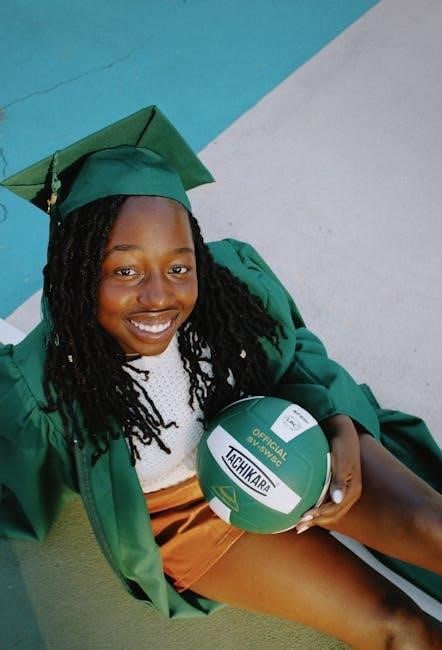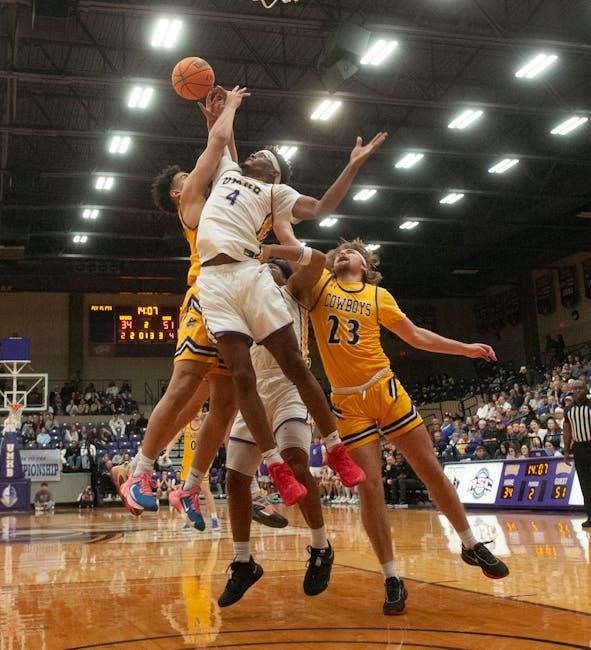sample email to college coaches pdf
Crafting effective emails to college coaches is crucial for student-athletes seeking scholarships or team placements. A well-structured email highlights achievements, showcases passion, and demonstrates fit for the program.
1.1. Importance of a Strong Subject Line
A strong subject line is essential when emailing college coaches, as it determines whether your email gets opened. Coaches receive numerous emails daily, so your subject line must stand out. It should be concise, clear, and specific, immediately conveying the purpose of your email. For example, “Interest in [Program Name] – [Your Name], Class of [Year]” or “Follow-Up After [Event Name].” Avoid generic or vague subject lines, as they may be overlooked. Including your name, grad year, and sport helps coaches quickly identify you. A well-crafted subject line not only grabs attention but also demonstrates professionalism and organization. It sets the tone for the rest of your email, making it more likely to be read and considered.
1.2. Key Elements of a Compelling Email
A compelling email to college coaches must include several key elements to ensure it captures their attention and effectively communicates your intent. First, a clear and personalized greeting addressed to the coach by name is essential. Next, a brief introduction of yourself, including your name, high school, grad year, and sport, provides immediate context. Highlighting your achievements, such as academic honors, athletic awards, and relevant stats, demonstrates your qualifications. Expressing why you’re interested in their program and how you align with their team’s values shows genuine interest. Attaching a resume or highlight reel provides additional evidence of your abilities. Finally, a polite closing with a call to action, such as requesting a follow-up, leaves a professional impression. Keeping the tone concise, respectful, and focused ensures your email is memorable and impactful.

Initial Contact Email to College Coaches
Your initial email should be concise, professional, and personalized, introducing yourself, sharing your achievements, and expressing interest in their program. Include a brief summary of your athletic and academic highlights, and attach relevant documents like your resume or highlight reel. Personalize the email by mentioning specific aspects of the program that align with your goals, demonstrating genuine interest. Keep the tone respectful and focused, ensuring the coach can quickly assess your fit for their team. A well-crafted initial contact sets the foundation for further communication and potential opportunities.
2.1. Sample Introductory Email Before a Tournament or Showcase
Dear [Coach’s Name],
I hope this message finds you well. My name is [Your Name], and I am a [Your Graduation Year] at [Your High School] in [Your Hometown]. I am reaching out to introduce myself and express my interest in the [Program Name] at [College/University Name].
I will be participating in the upcoming [Tournament/Showcase Name] on [Date], and I would be honored if you could attend to evaluate my performance. I have attached my athletic resume, which includes my achievements, stats, and highlight reel for your review.
I am particularly drawn to [College/University Name] because of its [specific program feature, coach, or team accomplishment]. I believe my skills and dedication align well with your team’s goals.
Thank you for considering my profile. I look forward to the possibility of connecting further.
Sincerely,
[Your Full Name]
Remember to personalize the email and attach relevant documents like your resume or highlight reel. Proofread your message before sending to ensure professionalism and clarity.
2.2. How to Personalize Your Story and Accomplishments
Personalizing your email is key to grabbing a college coach’s attention. Start by addressing the coach by name and mentioning specific aspects of their program that align with your goals. Highlight your unique achievements, such as awards, leadership roles, or standout performances, and explain why they make you a strong fit for their team.
- Research the coach and program to tailor your message.
- Mention specific team accomplishments or player styles you admire.
- Connect your personal goals with the program’s values or recent successes.
For example, “I admire how your team emphasizes [specific program trait] and believe my [specific skill or experience] would contribute to this approach.” Always keep your story concise and focused on what sets you apart as a student-athlete. This personalized touch shows genuine interest and increases the likelihood of a positive response.
Follow-Up Emails to College Coaches
Follow-up emails demonstrate persistence and gratitude, keeping you on a coach’s radar. Send one after events or interactions, thanking them for their time and reiterating interest.
- Express appreciation for their consideration.
- Mention specific observations or discussions.
- Reaffirm your fit for the program.
Keep it concise, professional, and personable to maintain a positive connection.
3.1. Sample Follow-Up Email After a Coach Watches Your Game
Dear [Coach’s Name],
Thank you for taking the time to watch me play at [Game Name]. I truly appreciate your interest and hope you enjoyed the game. I was proud of how our team performed, and I believe I demonstrated skills that align with your program’s needs.
I am excited about the opportunity to contribute to your team and would be happy to provide any additional information or discuss further how I can fit into your program. Please let me know if you would like to schedule a call or need more details.
Thank you again for your consideration. I look forward to the possibility of working together.
Sincerely,
[Your Name]
3.2. Tips for Writing a Post-Event Thank You Email
When writing a thank you email after an event, keep it professional and concise. Start with a polite greeting and express gratitude for the coach’s time. Mention specific moments or observations from the event to show genuine interest. Highlight how your skills align with the program’s needs and reiterate your enthusiasm for the opportunity. Avoid being overly lengthy but ensure your passion shines through. Include a call to action, such as requesting a follow-up conversation or expressing eagerness to provide more information. End with a sincere thank you and attach relevant documents like your resume or highlight reel for reference.

Email Templates for College Coaches

Email templates simplify outreach to college coaches, providing structure for initial contact, expressing interest, and follow-ups. They ensure clarity, professionalism, and consistency in communication.
4.1. Basic Email Template for Initial Outreach
A basic email template for initial outreach to college coaches should include a clear subject line, proper greeting, and concise introduction. Start with your name, graduation year, and current high school. Mention the sport you play and the team you represent. Express your interest in the coach’s program and explain why you are a good fit. Keep the email professional and brief, highlighting your achievements without overwhelming the reader. Attach your athletic resume and a highlight reel if available. Close with a polite thank you and a call to action, such as requesting a meeting or follow-up. Customize the template to reflect your personal story and the specific program you’re targeting. This structure ensures your email is organized, professional, and impactful.
4.2. Template for Expressing Interest in a Specific Program
When expressing interest in a specific program, your email should clearly state why you are drawn to the college, team, and coach. Begin with a strong subject line, such as “Interest in [College Name] Soccer Program.” Greet the coach by name and introduce yourself, including your name, graduation year, and current high school. Mention the sport you play and any relevant achievements. Explain why the program aligns with your goals, such as its competitive reputation or academic offerings. Highlight how your skills and experiences make you a strong fit. Attach your resume and highlight reel for reference. Close with a polite thank you and express your eagerness to discuss further. Customize the template to reflect your genuine interest and personal connection to the program.
What to Include in Your Email to College Coaches
Your email should include a strong subject line, personalized introduction, academic and athletic achievements, why you fit the program, and attachments like your resume and highlight reel.
5.1. The “Why” Section: Explaining Your Fit for the Program
The “Why” section is crucial in your email to college coaches, as it demonstrates how you align with the program’s mission and culture. Start by researching the team’s values, coaching philosophy, and recent achievements. Clearly explain why you are drawn to the specific college or university, mentioning aspects like academic programs, team culture, or location. Highlight how your skills, experiences, and goals match the team’s needs. Be specific about what you can bring to the program, such as leadership qualities or athletic accomplishments. Ensure your explanation is genuine and ties your aspirations to the opportunities the program offers. Keep this section concise but impactful, showing coaches you’ve done your homework and are genuinely interested in their program.
5.2. Attaching Relevant Documents (Resume, Highlight Reel)
When emailing college coaches, attaching the right documents is essential for making a strong impression. Include a concise resume that highlights your academic achievements, athletic accomplishments, and leadership roles. Ensure it includes your contact information, graduation year, and relevant statistics. A well-edited highlight reel is also crucial, showcasing your best moments in a short, impactful video. Keep the reel under 3-5 minutes and focus on skills relevant to the coach’s program. Attachments should be clearly labeled with your name and sport, and ensure files are in a universal format (e.g., PDF for resumes, MP4 for videos). Avoid oversized files that may not open easily. These documents complement your email by providing tangible evidence of your qualifications and fit for the program.

Best Practices for Communicating with College Coaches
Be concise, personalize your message, and always include a clear subject line. Attach relevant documents like your resume and highlight reel. Follow up after events to maintain engagement.
6.1. Keeping Your Email Concise and Professional
College coaches receive numerous emails daily, so brevity and professionalism are essential. Keep your message clear and focused, avoiding unnecessary details. Use a formal tone and proper salutations. Ensure your email is well-structured, with a clear subject line, introduction, body, and closing. Avoid using slang or overly casual language. Limit your email to 3-4 short paragraphs, making it easy to read. Personalize each email to show genuine interest in the program. Always proofread for grammar and spelling errors before sending. Including a professional sign-off with your contact information is also crucial. By keeping your email concise and professional, you demonstrate respect for the coach’s time and showcase your maturity and seriousness.
